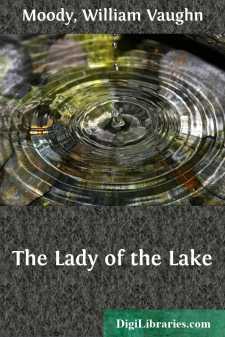Categories
- Antiques & Collectibles 13
- Architecture 36
- Art 48
- Bibles 22
- Biography & Autobiography 813
- Body, Mind & Spirit 142
- Business & Economics 28
- Children's Books 17
- Children's Fiction 14
- Computers 4
- Cooking 94
- Crafts & Hobbies 4
- Drama 346
- Education 46
- Family & Relationships 57
- Fiction 11829
- Games 19
- Gardening 17
- Health & Fitness 34
- History 1377
- House & Home 1
- Humor 147
- Juvenile Fiction 1873
- Juvenile Nonfiction 202
- Language Arts & Disciplines 88
- Law 16
- Literary Collections 686
- Literary Criticism 179
- Mathematics 13
- Medical 41
- Music 40
- Nature 179
- Non-Classifiable 1768
- Performing Arts 7
- Periodicals 1453
- Philosophy 64
- Photography 2
- Poetry 896
- Political Science 203
- Psychology 42
- Reference 154
- Religion 513
- Science 126
- Self-Help 84
- Social Science 81
- Sports & Recreation 34
- Study Aids 3
- Technology & Engineering 59
- Transportation 23
- Travel 463
- True Crime 29
The Lady of the Lake
Description:
Excerpt
Walter Scott was born in Edinburgh, August 15, 1771, of an ancient Scotch clan numbering in its time many a hard rider and good fighter, and more than one of these petty chieftains, half-shepherd and half-robber, who made good the winter inroads into their stock of beeves by spring forays and cattle drives across the English Border. Scott's great-grandfather was the famous "Beardie" of Harden, so called because after the exile of the Stuart sovereigns he swore never to cut his beard until they were reinstated; and several degrees farther back he could point to a still more famous figure, "Auld Wat of Harden," who with his fair dame, the "Flower of Yarrow," is mentioned in The Lay of the Last Minstrel. The first member of the clan to abandon country life and take up a sedentary profession, was Scott's father, who settled in Edinburgh as Writer to the Signet, a position corresponding in Scotland to that of attorney or solicitor in England. The character of this father, stern, scrupulous, Calvinistic, with a high sense of ceremonial dignity and a punctilious regard for the honorable conventions of life, united with the wilder ancestral strain to make Scott what he was. From "Auld Wat" and "Beardie" came his high spirit, his rugged manliness, his chivalric ideals; from the Writer to the Signet came that power of methodical labor which made him a giant among the literary workers of his day, and that delicate sense of responsibility which gave his private life its remarkable sweetness and beauty.
At the age of eighteen months, Scott was seized with a teething fever which settled in his right leg and retarded its growth to such an extent that he was slightly lame for the rest of his life. Possibly this affliction was a blessing in disguise, since it is not improbable that Scott's love of active adventure would have led him into the army or the navy, if he had not been deterred by a bodily impediment; in which case English history might have been a gainer, but English literature would certainly have been immeasurably a loser. In spite of his lameness, the child grew strong enough to be sent on a long visit to his grandfather's farm at Sandyknowe; and here, lying among the sheep on the windy downs, playing about the romantic ruins of Smailholm Tower, scampering through the heather on a tiny Shetland pony, or listening to stories of the thrilling past told by the old women of the farm, he drank in sensations which strengthened both the hardiness and the romanticism of his nature. A story is told of his being found in the fields during a thunder storm, clapping his hands at each flash of lightning, and shouting "Bonny! Bonny!"—a bit of infantile intrepidity which makes more acceptable a story of another sort illustrative of his mental precocity. A lady entering his mother's room found him reading aloud a description of a shipwreck, accompanying the words with excited comments and gestures. "There's the mast gone," he cried, "crash it goes; they will all perish!" The lady entered into his agitation with tact, and on her departure, he told his mother that he liked their visitor, because "she was a virtuoso, like himself." To her amused inquiry as to what a virtuoso might be, he replied: "Don't ye know? why, 'tis one who wishes to and will know everything."
As a boy at school in Edinburgh and in Kelso, and afterwards as a student at the University and apprentice in his father's law office, Scott took his own way to become a "virtuoso"; a rather queer way it must sometimes have seemed to his good preceptors. He refused point-blank to learn Greek, and cared little for Latin. His scholarship was so erratic that he glanced meteor-like from the head to the foot of his classes and back again, according as luck gave or withheld the question to which his highly selective memory had retained the answer. But outside of school hours he was intensely at work to "know everything," so far as "everything" came within the bounds of his special tastes. Before he was ten years old he had begun to collect chap-books and ballads. As he grew older he read omnivorously in romance and history; at school he learned French for the sole purpose of knowing at first hand the fascinating cycles of old French romance; a little later he mastered Italian in order to read Dante and Ariosto, and to his schoolmaster's indignation stoutly championed the claim of the latter poet to superiority over Homer; a little later he acquired Spanish and read Don Quixote in the original. With such efforts, however, considerable as they were for a boy who passionately loved a "bicker" in the streets and who was famed among his comrades for bravery in climbing the perilous "kittle nine stanes" on Castle Rock, he was not content....




